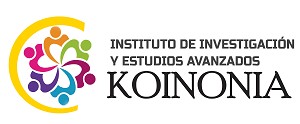Procesamiento analítico con herramienta business intelligence del seguimiento a graduados de pregrado en UNIANDES-Ecuador
Resumen
El propósito de esta investigación es aplicar una herramienta Business Intelligence, para gestionar la información del seguimiento a graduados de la Universidad Regional Autónoma de los Andes (UNIANDES), extensión Ibarra, ya que actualmente los datos de este módulo no están siendo utilizados en su totalidad y sobre todo como fuente para tomar medidas o acciones que apoyen el logro de los objetivos institucionales, desde un enfoque de investigación racionalista. Dos recursos importantes dentro de una organización son la información y el conocimiento, esto puede legitimar las decisiones, por eso la necesidad de gestionar los datos que se tienen y que de ellos se forje nuevo conocimiento, algo que se puede lograr si se toma en cuenta y aplican las nuevas tecnologías para realizar el seguimiento oportuno a los indicadores clave y contar con los medios suficientes para evaluar las diferentes alternativas que se dan en cualquier decisión a tomar.
Descargas
Citas
CEAACES. (2013). Modelo para la evaluación de las carreras presenciales y semi-presenciales de las universidades y escuelas politécnicas del Ecuador [Model for the evaluation of face-to-face and blended courses at universities and polytechnic schools in Ecuador.]. Obtenido de https://universidadsociedadec.files.wordpress.com/2014/04/ceaaces-eval-carreras-2013.pdf
Di Tria, F., Lefons, E., & Tangorra, F. (2015). Academic data warehouse design using a hybrid methodology. Computer Science and Information Systems, 12(1), 135-160. doi:10.2298/CSIS140325087D
Gómez, H., Ortiz, E., & Gonzalez, M. (2017). El estudio de egresados para la mejora continua de las Universidades: Estudio de caso de la Ingeniería en Computación [The alumni study for the continuous improvement of Universities: A Case Study of Computer Engineering]. RIDE. Revista Iberoamericana para la Investigación y el Desarrollo Educativo, 7(14), 1-23. http://dx.doi.org/10.23913/ride.v7i14.279
Kumar, G. (2016). Quality in higher education from different perspectives: a literature review. International Journal for Quality Research, 11(1), 17-34. doi:10.18421/IJQR11.01-02
Ley Orgánica de Educación Superior, LOES. Registro Oficial Suplemento 298 de 12-oct.-2010 Ultima modificación: 02-ago.-2018. https://www.ces.gob.ec/documentos/Normativa/LOES.pdf
López, J., Otegi, J., Porto, I., & Cobo, M. (2019). 30 years of intelligence models in management and business: A bibliometric review. International Journal of Information Management, 48, 22-38. https://doi.org/10.1016/j.ijinfomgt.2019.01.013
Lukic, J., Radenkovic, M., Despotovik, M., Labus, A., & Bogdanovik, Z. (Agosto de 2016). A hybrid approach to building a multi-dimensional business intelligence system for electricity grid operators. Utilities Policy, 41, 95-106. https://doi.org/10.1016/j.jup.2016.06.010
McCoy, C., & Rosenbaum, H. (2018). Uncovering unintended and shadow practices of users of decision support system dashboards in higher education institutions. Journal of the Association for Information Science and Technology, 70(4), 370-384. doi:10.1002/asi.24131
Morales, A., Cuevas, R., & Martínez, J. (2016). Procesamiento Analítico con Minería de Datos [Analytical Processing with Data Mining]. Revista Iberoamericana de las Ciencias Computacionales e Informática, 5(9), 1-22. https://www.reci.org.mx/index.php/reci/article/view/40
Rajnoha, R., Štefko, R., Merková, M., & Dobrovič, J. (13 de Enero de 2016). Business Intelligence as a key information and knowledge tool for strategic business performance management . Information Management, 183-203. doi:10.15240/tul/001/2016-1-013
Reyes, F., Fuertes, W., Guzmán, C., Pérez, E., Bernal, P., & Villacís, C. (2018). Application of business intelligence for analyzing vulnerabilities to increase the security level in an academic CSIRT. Revista Facultad de Ingeniería, 27(47), 21-29. http://dx.doi.org/10.19053/01211129.v27.n47.2018.7747
Roque, Y. G., Herrera, A., Salazar, Y., Betancourt, C., & Figueredo, K. (2018). Pertinencia de la formación académica de enfermería. Universidad Nacional de Chimborazo. Ecuador [Relevance of academic nursing education. National University of Chimborazo. Ecuador]. EDUCACION MEDICA, 19(52), 73-78. https://doi.org/10.1016/j.edumed.2017.04.010
Rosales, G., Genovez, A., Chumbi, V., & Buñay, R. (2017). Estudio histórico del seguimiento a graduados en la carrera de Psicología de la Universidad de Cuenca, Ecuador [Historical study of the follow-up of psychology graduates at the University of Cuenca, Ecuador]. Revista Cubana Educación Superior, 2, 126-141.
Tundidor, L., Nogueira, D., & Medina, A. (2018). Organización de los sistemas informativos para potenciar el control de gestión empresarial [Organization of information systems to enhance business management control]. Cofin Habana, 12(1), 88-110.
UNIANDES. (2017). Reglamento de Régimen Académico [Academic Regulations]. Recuperado de https://acortar.link/aGbVi2
Yalagi, P., Gandhmal, D., & Dixit, R. (2018). Business intelligence tools – content generation using moodle for self learning as an elective module. Journal of Engineering Education Transformations, 31(3), 243-249.
Derechos de autor 2022 Ketty Mercedes Arciniega-Herrera, Ariel José Romero-Fernández, Ana Lucía Sandoval-Pillajo, Luis Llerena-Ocaña

Esta obra está bajo licencia internacional Creative Commons Reconocimiento-NoComercial-CompartirIgual 4.0.
CC BY-NC-SA : Esta licencia permite a los reutilizadores distribuir, remezclar, adaptar y construir sobre el material en cualquier medio o formato solo con fines no comerciales, y solo siempre y cuando se dé la atribución al creador. Si remezcla, adapta o construye sobre el material, debe licenciar el material modificado bajo términos idénticos.
OAI-PMH URL: https://cienciamatriarevista.org.ve/index.php/cm/oai














